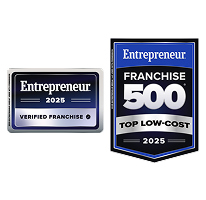Whether you’re thinking of buying and actively operating a business franchise of your own or serving as a passive investor in someone else’s entrepreneurial pursuit, you don’t want to make costly mistakes. It helps to be able to identify (and avoid) the most common errors when buying a franchise. This is especially valuable advice if you’re a first-time business owner or investor.
After all, while franchise business owners in general have significantly lower failure rates than independent startups, first-timers in all types of business ownership fail more often than veteran entrepreneurs.
So, take a look at some of the first-time franchise investor mistakes you’ll definitely want to avoid.
Here are the 7 Expensive Franchise Investment Errors
Avoid franchise failures. Here are several mistakes first-time franchise investors (and even wily veteran entrepreneurs) can make — and start their business on shaky grounds.
Inadequate Research
Franchise due diligence is critical. Don’t necessarily go with the first franchisor who encourages your interest. Or the first you can easily afford.
If you’ll be actively involved, make sure the business represents a line of work you can see yourself being passionate about now and into the future. How will you feel about going into work most mornings and staying until the work is done?
Is the business a brand you and others know and trust? Does the franchise disclosure document (FDD) you’ll receive feel right? If you have questions, are they clearly and comprehensively answered by the company representative?
If you can, meet other franchisees and see what they think about the business and how the reality meshes with the pitch.
Ignoring Your Advisors
Lawyers and accountants should be integral parts of your due diligence team. You’ve hired them for a reason. While you’ll make the final decision, don’t blow off concerns voiced by your key advisors.
Make sure they have time to review your FDD. If they have questions or concerns, let them meet with your franchise rep or voice those concerns yourself. And if the people you most trust tell you to walk away (or run) — perhaps you should.
Choosing Location Based on Your Needs Rather Than the Business’s
Location, location, location. You’ve heard that mantra, right? It’s a way of impressing the importance of where your home or business is based, over other factors.
Where should your new business be based? Where your customers are, that’s where. Where the competition isn’t stronger than the market. You’d love to launch in your hometown or favorite city neighborhood, but do your due diligence first. Go where your customers are — not just where you’d like to be.
Underestimating Total Investment Costs

The apples-to-apples way of pricing franchise investment opportunities is to look at the franchise fee. This is the initial cost that all franchisors charge, the “price of admission,” so to speak. Paying the fee lets you call yourself a McDonald’s restaurant, a Freeway Insurance broker, a Merry Maids housecleaner, or a Marriott Hotel innkeeper. That cost can be anywhere from a few thousand dollars to seven figures.
But that’s only your starting point when estimating your startup costs. Don’t forget everything from office or facility rent to employee costs (if you have any), advertising and promotion, inventory, and a multitude of taxes, among many other hidden and blatant costs.
Get your accountant involved. Find out from the franchise rep and other franchisees how long it will be before the company starts to turn a profit. And make sure you have enough startup capital to get by until you do start generating a return on investment.
Failing to Investigate Franchisor Support Quality
There’s a reason you chose a franchise business model rather than going off entirely on your own. Actually, there are several reasons, but one of them is that you know that your franchisor knows how to do business because they’ve done it successfully for years. Or decades. They can answer your questions and provide expert training, day-to-day support, and guidance as you need it.
But will they?
What’s the quality of the training and support you receive? If it’s minimal, and then you’re on your own, you might as well have saved the cost of the franchise fee and truly gone solo. What do you need them for?
This is another issue to address with other franchisees before you sign on. Make sure your discussions are with franchisees who are far out of your marketing area so they won’t see you as a competitor and refuse to share information.
Ask them about the quality of the training and whether they feel free to pick up the phone and reach out to experts in the franchise operation when they need help. This is a critical way to avoid a costly first-time franchise buyer mistake.
Neglecting Insurance and Risk Management
Add at least one more member to your trusted advisor team: a business insurance agent. There are endless types of business insurance, and you certainly won’t need all of them. But you’ll want liability coverage to protect against lawsuits, a fleet policy if you have multiple vehicles, workers compensation if you have employees, cyber liability if you’ll be conducting ecommerce…
The point is, only a knowledgeable business insurance agent knows all of the policies that might be relevant to your operation. Take that agent into your confidence and make them another trusted advisor for proper risk management and assurance against catastrophic economic loss.
Rushing to Sign Contracts Without Thorough Franchise Due Diligence
These are exciting times, when you’re about to become a first-time franchise owner or investor. And your company rep might be just as excited about the prospects of you joining the team as you are. But don’t be rushed into anything.
Check off all of the above-listed tips and advice to make sure you’ve done proper and thorough franchise due diligence. Never let the rep pressure you into making a decision or put you on a timeline. If you don’t feel like you’re being given the time and help you need to research the opportunity, it might be a sign that you should be looking elsewhere.
Your rep should be transparent, comprehensive, and willing to clearly answer all of your questions and show patience as you do your due diligence. If this is what you get, you might be on the right track.
We Patiently Invite Your Franchise Interest at Freeway Insurance
At Freeway Insurance, we’re steadily building a coast-to-coast network of franchise-ready markets. We do it without pressure, deadlines, or false promises. You’ll get answers to your questions, details in writing, and encouragement, but without the hard sell.
Once aboard, you’ll receive top-tier training that can even include input on the certification and licensure you’ll need for the state in which you’ll do business. Once you open for business, we offer support and guidance whenever you need it for the best of both worlds: You’re on your own as a business owner, but have full-time assistance as needed by experts in the field.
Furthermore, you’ll be selling leading brands from one of the nation’s largest personal lines insurance providers. You’ll have an inventory to attract customers wherever the business takes you. It all adds up to making Freeway franchises among the most profitable in which to invest.
Want to learn more? Call us at 877-822-3024. You can also give us your contact information, and our franchise representative will reach out to you.



